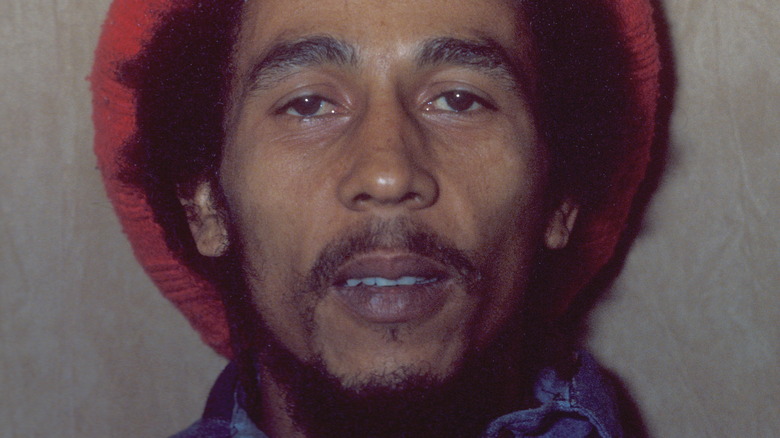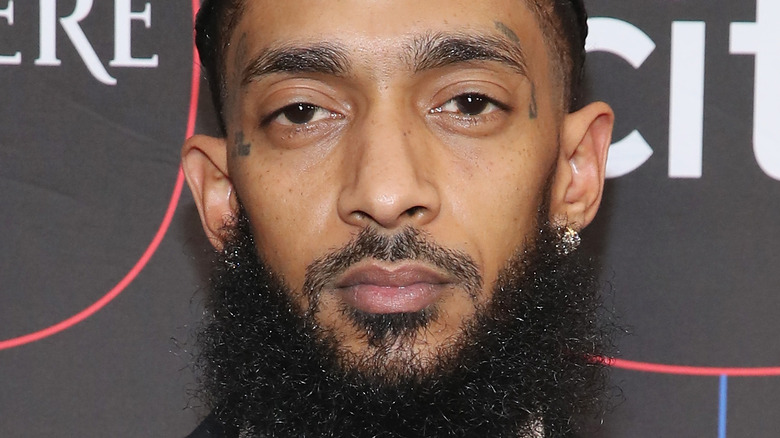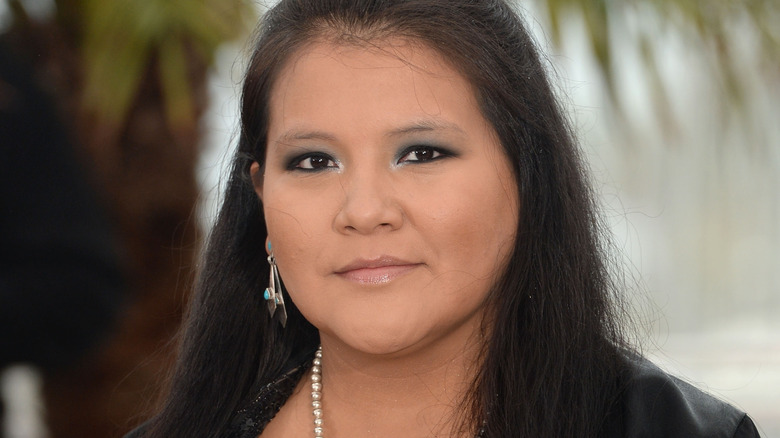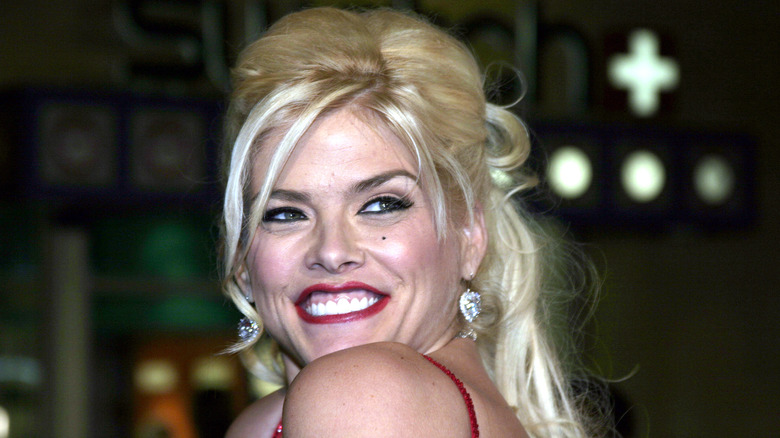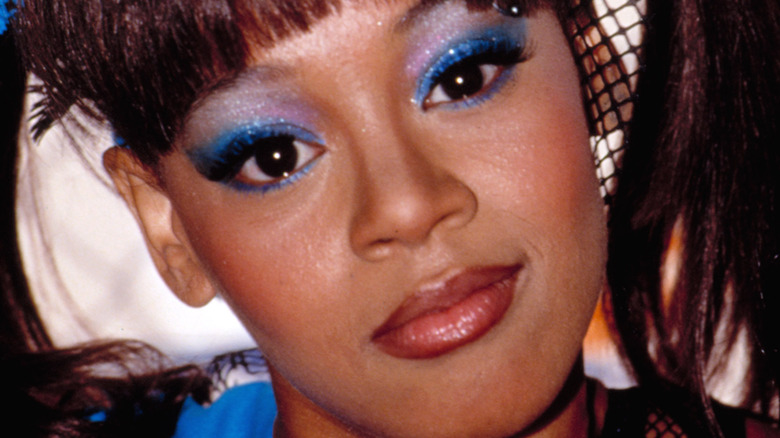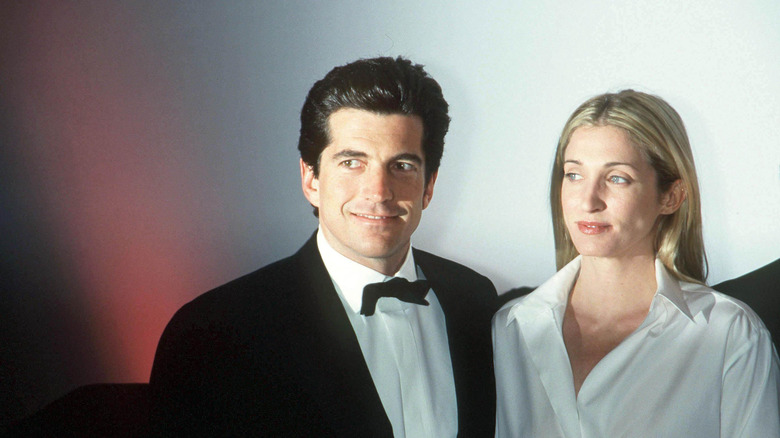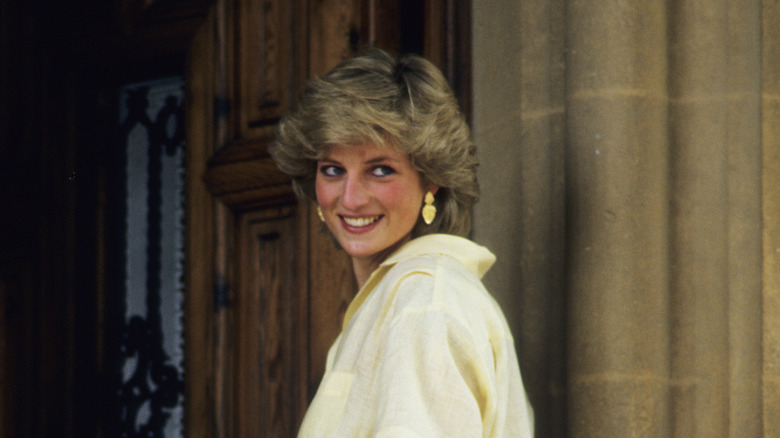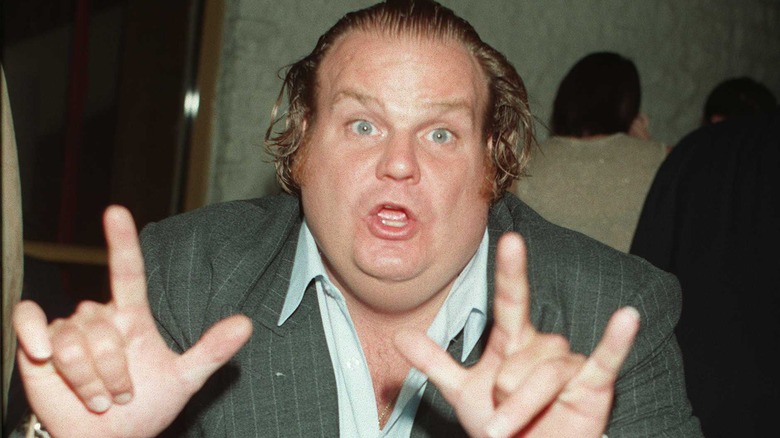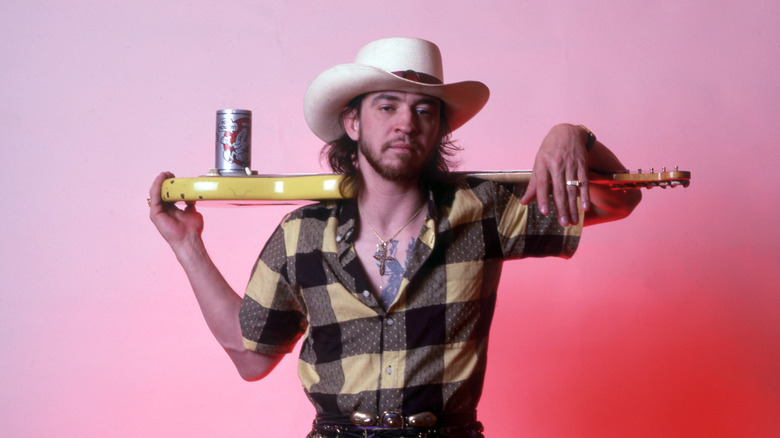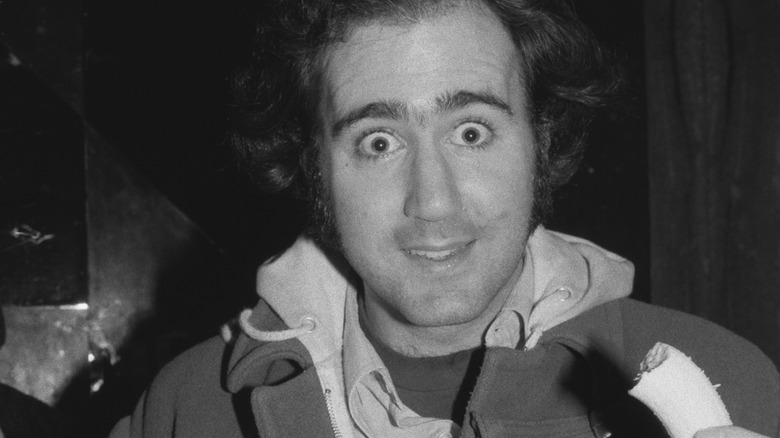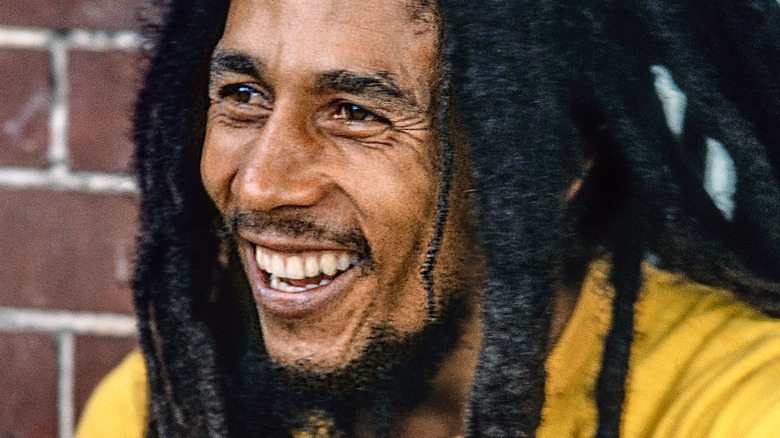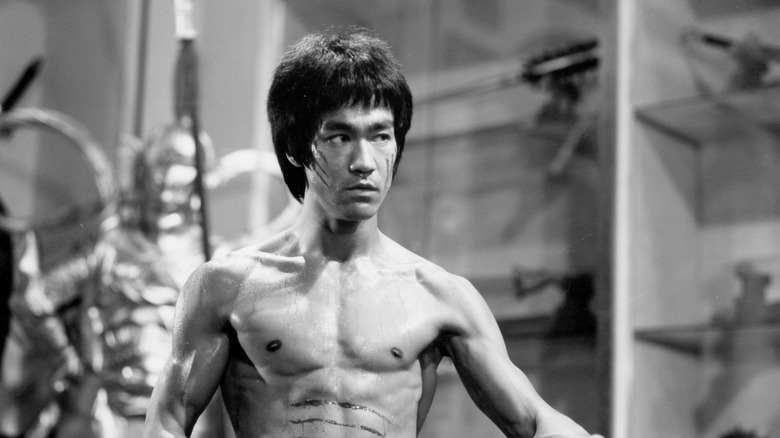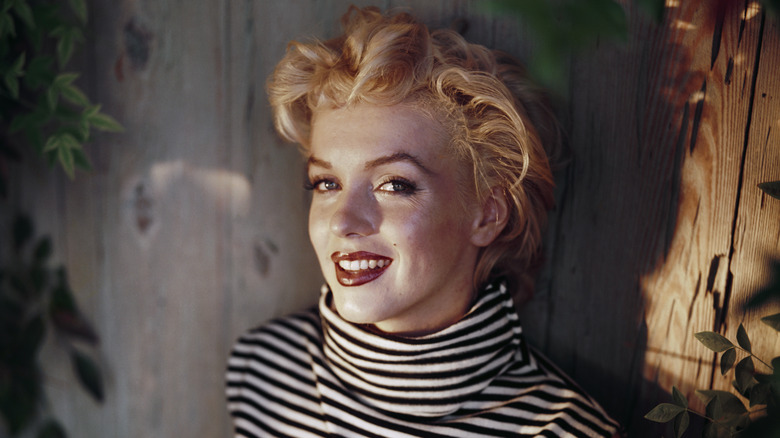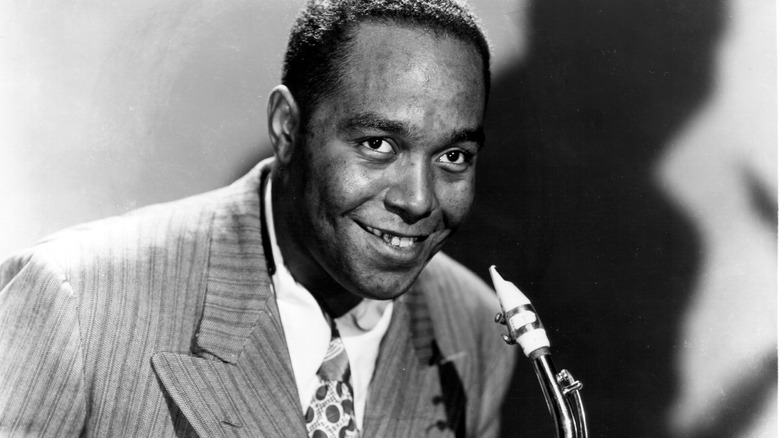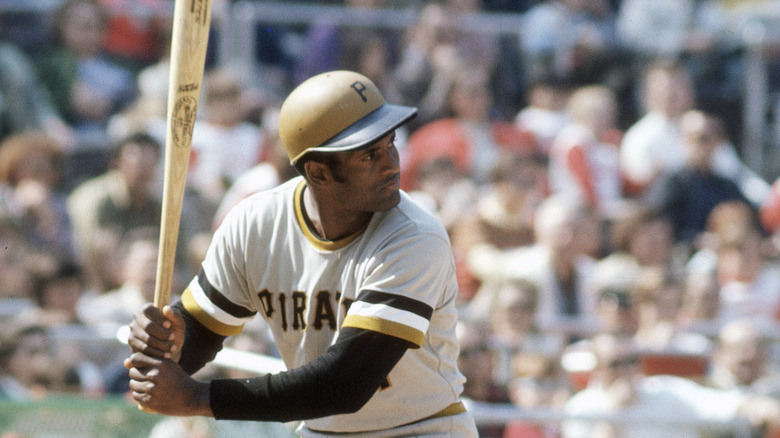Famous Celebrities Who Died In Their 30s
The 30s tend to be a decade where people settle down and their lives fall into place when it comes to families and jobs. Obviously, there are endless exceptions, but generally, the 30s are seen as a good decade, when you're still young, but old enough to have a bit of knowledge about the world that saves you from the pain and mistakes of your teens and 20s. You can see where your life is going and make some concrete plans for the future.
Perhaps that's part of what makes it so sad when a celebrity dies in their 30s. By then, celebs usually have a decade or more in the spotlight, so we feel like we know them and have fallen in love with their work. We see their futures as well, bringing us more movies and music to enjoy. But then that future is gone. Here are famous celebrities who died in their 30s.
This article discusses addiction and suicide. If you or anyone you know is struggling with addiction issues, help is available. Visit the Substance Abuse and Mental Health Services Administration website or contact SAMHSA's National Helpline at 1-800-662-HELP (4357). If you or anyone you know is having suicidal thoughts, please call the National Suicide Prevention Lifeline at 1-800-273-TALK (8255).
Nipsey Hussle
Calling Nipsey Hussle a rapper is accurate, but also doesn't fully capture his wide range of abilities. At the time of his death in 2019, he'd been successful in multiple areas. According to CNN, he'd founded his own record label, opened a clothing store in Los Angeles, founded a company centered around giving back to his community, had been nominated for a Grammy, and was planning to start a sports agency.
But it was his community work that was most important to him. At his funeral, Hussle's brother, Samiel Asghedom (via Billboard) talked about how the rapper hadn't followed the stereotypical route of a star: "A lot of people thought coming up when he first got signed, he was gonna get some money and leave. They had no clue what he really was gonna do. I want everybody to know man, Nip put his heart and soul on Crenshaw and Slauson." Former president Barack Obama even sent a statement to be read at Hussle's funeral that emphasized his was "a legacy worth celebrating."
The area Hussle had grown up in was not the safest, and he was "a devout member of the Rolling Sixty Crips," by his own admission, but was working with the police on ways to reduce gang violence. But on March 31, 2019, after tweeting that "having strong enemies is a blessing," Hussle had a run-in with fellow Rolling Sixty member Eric Holder, who he called a "snitch." Shortly thereafter, Holder shot Hussle, who was pronounced dead at the hospital. He was 33.
Misty Upham
According to the Guardian, Misty Upton was not short of drive. She was only 12 years old when she told a class of fellow performers, "My name is Misty Upham, and someday you will know that name as the best living Native American actress." Upton did go on to have an impressive career, one that was still on the rise when she died. She'd just appeared in the film adaptation of "August: Osage County," which was packed with A-list talent, including Meryl Streep and Julia Roberts. Upton shone among them in a supporting but significant role.
While she was proud of her heritage, the inherent biases of Hollywood meant she often didn't get the work she deserved. As she explained to Figure/Ground, "I went almost two years without work because I refused to take 'rez roles' ... It's frustrating as an actress of Native blood, to go into meetings and casting and have a great connection and feel like you'll be considered for work– any work– only to hear the person say, 'Well, I don't have any Native roles at the moment, but I'll call you if one comes up.' It's like Hollywood and the rest of the world can't get their heads around the fact that Natives are modern."
In 2014, BBC News reports Misty Upton went missing, before her body was found by a search party organized by her family. The cause of death was blunt force trauma, most likely caused by a fall off a cliff, either on purpose or accidental. She was 32.
Brittany Murphy
Brittany Murphy burst onto the scene with a hilarious and touching performance in 1995's "Clueless," and the next decade and a half saw her star in films like "8 Mile," as well as have a high-profile relationship with Ashton Kutcher. But she's probably most famous for how she died, since it was so sudden and tragic, and has led to plenty of conspiracy theories.
According to Esquire, Murphy collapsed in the bathroom of her home in 2009. The cause of death was pneumonia, which was made worse by anemia and the (legal) drugs she'd been taking. Murphy had felt terrible for some time, and doctors have since said that if she'd gone to the hospital even a day or two before she died, she could have been saved. When her husband Simon Monjack died in the same home from pneumonia and anemia six months later, even non-conspiracy theorists raised an eyebrow.
It didn't help that Brittany Murphy's estranged father announced he believed she'd been poisoned. Murphy's mother made a rare statement, writing "Angelo has shown he only wants to trade on Brittany's life, career, and good reputation — even at the cost of putting a cloud over her memory." Rather than focus on the sordid, Murphy's mother hoped people would focus on her daughter's successes. "I want my Brittany to be remembered as the darling person she was, for the giant talent she showed the world (and left behind in her movie and TV appearances) and for the friendships and loving relationships that really were part of her life."
Anna Nicole Smith
Anna Nicole Smith was one of the first famous-for-being-famous modern socialites. According to the Emmys' official site, Smith had a difficult beginning, dropping out of school in the 9th grade, marrying at just 16, and becoming a single mother before 20. While working odd jobs, she sent her photos to Playboy magazine, and almost overnight everything changed. She was named Playmate of the Year for 1992, which led to a massive ad campaign with Guess? jeans and small film roles.
But she would quickly become most famous for her personal life when she met and married a billionaire oil tycoon who was an astonishing 63 years her senior. After he died barely a year later, Smith would end up spending what would be the rest of her life in court trying to get part of his fortune. She also got her own reality show because people were fascinated with the spectacle.
When Anna Nicole Smith died on February 8, 2007, she'd recently been making headlines again, this time for the drama surrounding the birth of her daughter. Three men claimed to be the father, including the husband of actress Zsa Zsa Gabor. But in the middle of that drama, Smith got really sick, and chose to self-medicate at a hotel rather than go to the hospital, Today reported. She would end up accidentally overdosing on nine different drugs, including an uncommon one, chloral hydrate, which also killed Marilyn Monroe, to whom Smith was often compared. Smith was 39.
Lisa 'Left Eye' Lopes
At the time of her death in 2002, Lisa "Left Eye" Lopes was part of the then "most successful girl group in history," according to Rolling Stone. With her bandmates Tionne "T-Boz" Watkins and Rozonda "Chilli" Thomas, Lopez helped write some of TLC's biggest hits and even came up with the ideas for their videos. The group sold 21 million copies total of the three albums they released in the '90s and won four Grammy awards.
But despite how good all that looked on paper, Lopes' life was extremely difficult, and she kept making headlines for the wrong reasons. After a childhood with an abusive father and multiple moves ("The amount of change that I went through would probably drive a normal person nuts," Lopes told a Rolling Stone reporter), she couldn't even celebrate getting a record deal with TLC, as her father was killed the same day. Her relationship with the "jealous" football player Andre Rison eventually led to an argument where she burned down his house, and was later fined for arson. TLC also filed for bankruptcy.
Less than a year before she died, Lopes told an interviewer, "Everyone feels like they know me because they follow the news, and they don't have a clue as to who I am." Sadly, CNN reports that while on an extended trip to Honduras for a "spiritual retreat," Lopes was involved in a head-on collision and died at the scene. She was 30.
John F. Kennedy Jr. and Carolyn Bessette-Kennedy
As the son of President John F. Kennedy and Jaqueline Kennedy, JFK Jr. was the closest thing America has to royalty. The country had seen him grow up, including his famous salute – as a 3-year-old – of his father's coffin (via History).
As you'd probably expect from someone very rich and famous who had a tragic childhood, JFK Jr. didn't seem to know what to do with himself in adulthood. He tried acting, then became a lawyer, before finally founding his own magazine, George. It was the same with the many women he dated, including actress Daryl Hannah. Finally, he settled down with Carolyn Bessette, a gorgeous publicist, when they married in a small and (mostly) secret wedding. They lived the life of beautiful young socialites in New York City, although it's now known their marriage was rocky and they may have been headed for divorce, according to Harper's Bazaar.
Then, on July 16, 1999, the couple took off for the wedding of one of the many Kennedy cousins. Carolyn's sister Lauren came with them in the small plane, flown by JFK Jr., even though he was a very novice pilot and the weather was bad. One of the flight instructors at the New Jersey airport they took off from said he offered to come, but JFK Jr. "wanted to do it alone." The plane never arrived at its destination, and the wreckage was recovered five days later. Carolyn was 33; JFK Jr. was 38.
Diana, Princess of Wales
Princess Diana's dramatic life needs no introduction, as her story has been told in innumerable books, movies, documentaries, and splashed across the headlines of both tabloids and legitimate newspapers. After finally divorcing Prince Charles in 1996, it seemed like Diana might get to live the life she wanted for the first time. Instead, it would come to a violent and tragic end.
History reports that on August 31, 1997, Diana was in Paris with her new boyfriend, the heir Dodi Al-Fayed. They tried to have dinner at a hotel restaurant, but the press and onlookers made it impossible, so they left in a car. Shortly after, that car crashed in a tunnel, killing three of the four people inside, including Diana and Al-Fayed. She was 36. They'd been being pursued by photographers when the crash happened. At Diana's funeral, her brother would eulogize her as the "most hunted person of the modern age" (via History).
An inquest into the death stretched on for years. Blame was thrown around. The inquest found the car's driver was drunk, he was speeding to get away from the paparazzi, and that Diana and Al-Fayed might have survived if they had been wearing their seatbelts. But Diana had also refused to have police bodyguards, and the former chief told the inquest that decision also contributed: "If, as it was my wish, she had had police protection in Paris, then I am absolutely convinced those three lives would not have been tragically lost."
Chris Farley
Chris Farley made viewers cry with laughter during his stint on "Saturday Night Live" and in classic films like "Tommy Boy." But like many of the funniest comedians, his humor masked a lot of pain. The Los Angeles Times reported that Farley's loved ones admitted after he died that he'd been "wag[ing] a battle against overeating, drugs, and alcohol." It was the drugs that would end up killing him, although his other issues did not help. "Both lungs showed edema and congestion, which is a common finding in opiate intoxication," the medical examiner wrote. "The liver showed fatty change which is frequently seen in heavy drinkers." The cause of death was determined to be an accidental overdose of morphine and cocaine. Farley was 33.
Comedian Al Franken told the Chicago Tribune (via the AP) that his friends had tried to help Farley. "This was not something where people around him ignored [his problems]. It wasn't something where he ignored it. It was something he didn't have power over."
The comedian's influence was still felt long after he died. On the anniversary of Farley's death in 2018, friends took to social media to remember him. Stephen Colbert tweeted (via CNN), "Chris Farley and I started at Second City on the same day. You knew the minute you saw him on stage he was great. He was sweet and smart and funny. When I heard he had died, 21 years ago today, I fell to the ground. Rest In Peace."
Stevie Ray Vaughan
On August 26, 1990, Stevie Ray Vaughan played a concert in Wisconsin with other musicians, including Eric Clapton. Earlier that day, Guitar World says Vaughan had mentioned a weird dream he had where he'd died and was watching his own funeral. Sadly, that dream would be proficient, and the show would be his last.
Eric Clapton told Rolling Stone the show was incredible. Vaughan had been sober for three years, and it showed. Clapton recalled, "When he played that night, he had all of us standing [there] with our jaws dropped. I mean, Robert Cray and Jimmie Vaughan and Buddy Guy were just watching in awe. There was no one better than him on this planet. Really unbelievable."
But after the show ended, they all wanted to get back to Chicago quickly, and piled into helicopters. "There was a convoy of helicopters, about five of them, and they had to go back through this very thick fog up to about 100 feet above the ground," Clapton explained. "And once we came out of that, we just took off for Chicago. When I got back, I went straight to bed. And I was woken about seven in the morning by my manager, Roger Forrester, saying that the helicopter with Stevie Ray and our chaps hadn't come back. And then a bit later, someone discovered the wreckage. That was it." The helicopter carrying Vaughan and others, including Clapton's agent, crashed into a mountain, killing all on board. Vaughan was 35.
Andy Kaufman
Andy Kaufman died of cancer on May 16, 1984, at the age of 35 ... probably. The problem is that Kaufman committed so fully to his bits and characters, that urban legends say he faked his death as part of another weird performance piece to trick his audience, in this case, the entire world. Even his family members aren't necessarily convinced he's actually dead. (If he is alive, Kaufman would still only be in his early 70s, so it's feasible.)
The Hollywood Reporter talked to one of Kaufman's best friends, who explained how Andy could have faked the funeral: "It was a closed casket. Only the family [and myself] actually saw the body." Okay, so they did see Kaufman's body, so he can't be alive, right? He continued, "One of the things Andy was taught at the highest level was a process where one could slow down his breath to a point where you can literally fool anyone that you may be dead when in fact you are alive." And it doesn't sound like the family looked too closely. "It was a very formal affair — it wasn't as though they could prod or anything else. They were simply in the room and saw Andy lying in a coffin."
Why would the successful comedian/actor want to fake his death anyway? Andy's brother Michael later received a letter, allegedly from Andy, which said "everything was great in his life and he just wanted to get away from being Andy Kaufman."
Bob Marley
Bob Marley introduced a whole new audience to reggae around the world. According to the BBC, Time magazine would name Marley's 1977 album "Exodus" the best one of the entire 20th century. In his next to last concert, at the iconic Madison Square Garden in 1980, Marley was opening for the Commodores, but it sounds like he was really the main event. "The reggae star had the majority of his listeners on their feet and in the palm of his hand," according to then-New York Times critic Robert Palmer (via History). "After this show of strength, and Mr. Marley's intense singing and electric stage presence, the Commodores were a letdown."
The fact he was able to play at all, let alone at the top of his game, was made even more astonishing considering what happened next. Only a few days after that performance, Marley collapsed and was taken to the hospital, where he learned that a small cancerous growth on his toe that he'd been diagnosed with in 1977 had metastasized. There was no hope, as it had already spread to many of his major organs. Tragically, the cancer was probably related to an old soccer injury, and Marley loved soccer just as much as music. He once said, "Playing [soccer] and singing is dangerous ... I sing about peace, love and all of that stuff ... [but] if a man tackle you hard it bring feelings of war."
Eight months later, on May 11, 1981, Bob Marley died, aged 36.
Bruce Lee
Of all the actors one would think could live forever, Bruce Lee would be top of that list. His extreme devotion to fitness is legendary, with Biography recording that he didn't drink or smoke and ate a specific regimen, including raw meat, so that his body was perfectly toned. His films reflected this, with Lee showing off his moves and strength in classic action scenes.
And then, suddenly, he was dead. Lee was in Hong Kong on July 20, 1973, when he took a pill and lay down, and never woke up. He'd been suffering from headaches and seizures for a few weeks and had been diagnosed at a hospital with cerebral edema. Bruce Lee's official site describes the cause of death: "He was offered a prescription painkiller called Equagesic. After taking the pill, he went to lie down and lapsed into a coma. He was unable to be revived. The determination was that Bruce had a hypersensitive reaction to an ingredient in the pain medication that caused a swelling of the fluid on the brain, resulting in a coma and death." Lee was 32.
But as with most sudden deaths of famous people, there are rumors and urban legends about what "really" happened. History says these include conspiracy theories that the Chinese mafia killed Lee, or that the Lee family was suffering under a generation-spanning curse (this theory was raised again when Bruce's son Brandon died after an on-set accident at 28.)
Marilyn Monroe
Marilyn Monroe's death at just 36 in 1962 sent shockwaves around the world. While her problems were well-known, no one thought someone so beautiful could just die like that. The iconic actress who would inspire songs, films, and endless imitators was found in her bed, holding the phone as if she was trying to call for help before she died. She was surrounded by empty pill bottles. According to History, an investigation found her death was "caused by a self-administered overdose of sedative drugs and that the mode of death is probable suicide." Forensic pathologist Cyril Wecht told People that, more specifically, it was caused by "acute combined drug toxicity, chloral hydrate, and Nembutal."
Some people agreed Monroe was in a bad place at the time. A photographer said, "Life had put her in a corner and she was trying to get out." But others thought the idea Monroe would actually kill herself was ludicrous. "It is my feeling," her live-in housekeeper said, "that Marilyn looked forward to her tomorrows." And photographer George Barris recalled, "She told me, 'These are my champagne days.'"
Still others think there is something very sinister about her death, and there are plenty of unanswered questions. "With the number of capsules she would have to have ingested," Wecht told People, "there should have been some evidence of it." Others mention her connection to the Kennedys, but despite the conspiracy theories, it was probably an accidental overdose.
Charlie Parker
Miles Davis, one of the best jazzmen there ever was, once said, "You can tell the history of jazz in four words: 'Louis Armstrong. Charlie Parker'" (via the Telegraph). Considering that company and the person saying it, you know Charlie Parker had to be exceptional. And he was. But he was also deeply troubled, and his life was filled with the excesses that many musicians fall victim to. And it was bad. So bad, that in 1993, long after he died, Parker's widow said she hoped, "Maybe he'll be remembered as not just the most famous junkie of his time" (via the Independent).
While Parker was reinventing jazz and how music was played, while he was showing off his brilliant improvisational skills, he was "a man living for the pleasure principle, music, food, sex, drugs, kicks, his personality arrested at an infantile level. A man with almost no feeling of guilt and only the smallest, most atrophied nub of conscience," according to a psychiatrist who examined him. His drummer called Parker a "sociopath."
A member of Parker's first band said, "The way he was going with that dope and all, he could only last so long." The hard-living in between his brilliant concerts had taken such a toll on Parker's body that during his last few days, the doctor who attended him thought Parker was in his 50s or 60s. Physically worn out, the jazz great died on March 12, 1955, aged 34.
Roberto Clemente
When you are a famous professional athlete, it can be easy to forget the little people. Then there's Roberto Clemente. Sportscasting calls him "one of the hardest working and most caring professional athletes of all time." So it is unbelievably tragic that his death occurred because he was helping people in need.
The baseball player famous for playing on the Pittsburgh Pirates was equally well-known for his charity work, especially in Latin America and the Caribbean. In 1972, there was a large earthquake in Nicaragua and Clemente was sending supplies for the survivors. However, there had been issues, as some people had gotten their hands on the supplies that were not interested in helping others in need. Clemente "had received reports that some of the food and clothing he had sent earlier had fallen into the hands of profiteers," according to his friend Cristobal Colon (via the New York Times). A member of the committee working with Clemente explained why the baseball player got on a plane to go to Nicaragua: "We sent a ship loaded with supplies during the week ... Roberto went on the plane ... to get there before the ship arrived to see the supplies were distributed properly." But the plane was in serious need of repair, and exploded after takeoff, killing all on board. Clemente was 38.
In his memory, Major League Baseball gives the annual Roberto Clemente Award to the player who "best exemplifies the game of baseball, sportsmanship, community involvement and the individual's contribution to his team."
